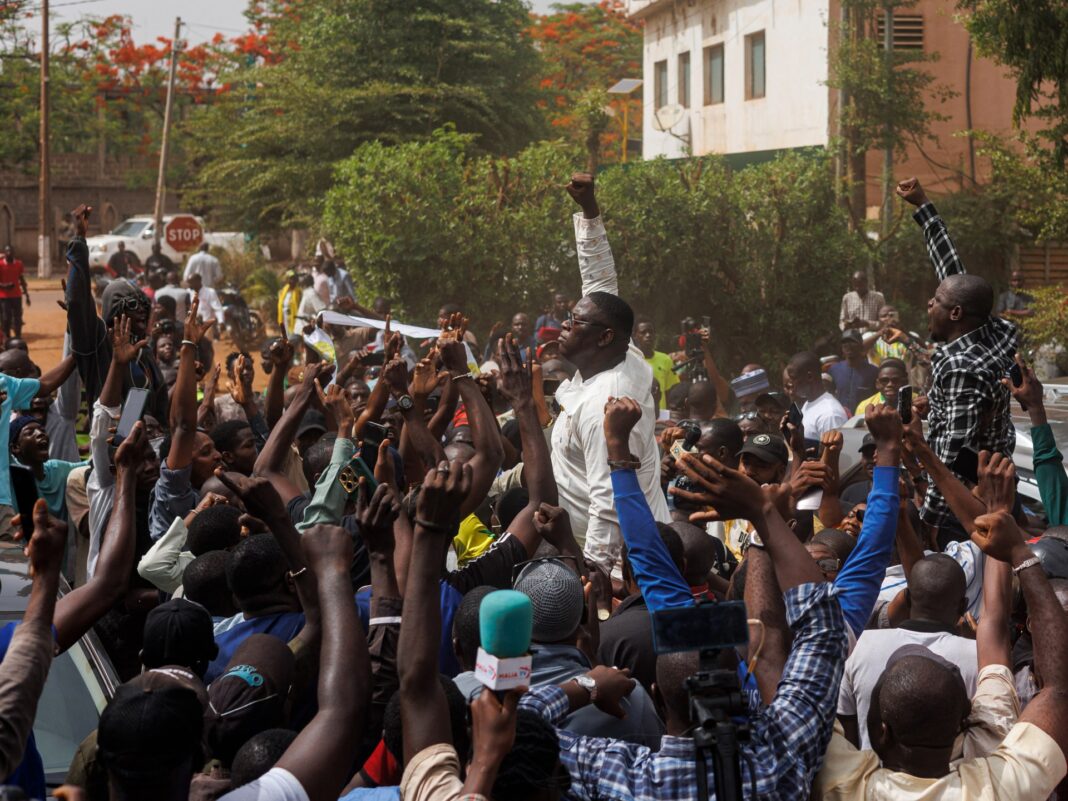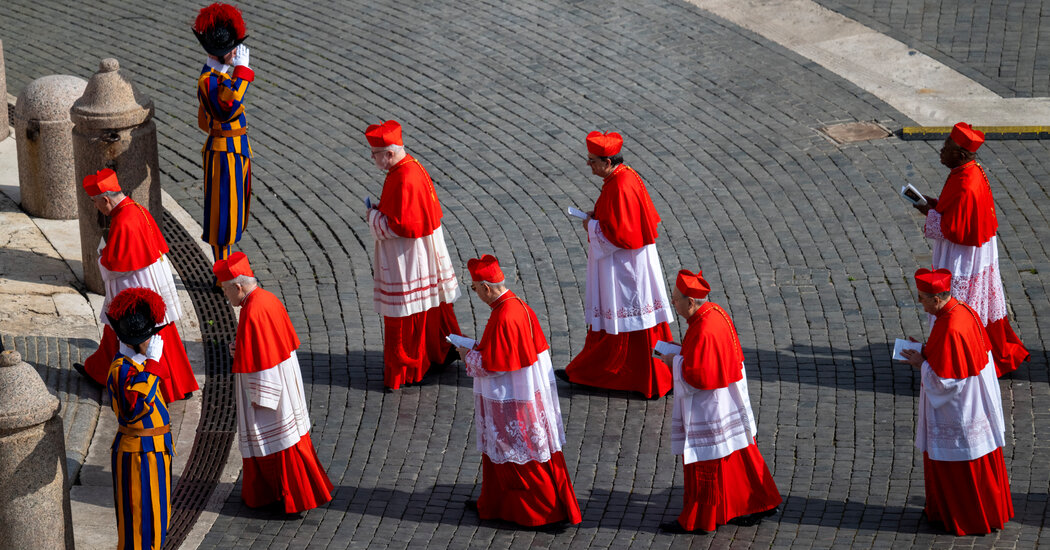When Mali’s Colonel Assimi Goita first seized power in a coup in 2020, the West African nation erupted in joy. His promises to hold elections and bring stability to parts of the country troubled by armed groups were tantalising for a nation under siege.
Nearly five years later, however, Goita has repeatedly reneged on those promises. The security situation has only marginally improved, with violence and killings – sometimes by government forces – reported regularly in areas outside the capital, Bamako, while elections have been postponed.
Somehow, popular support for Goita has largely held – until now.
Public anger at the military government was evident on May 3 when hundreds of people gathered in Bamako with defiant fists raised in protest. The demonstrations – a visible first against the military – came after government officials “proposed” at a national conference last week that Goita lead the country until 2030 and that political parties be dissolved.
On Wednesday, the government suspended political parties “until further notice for reasons of public order”, before mass protests slated for Friday.
The rare revolts signal a reawakening by Malians, whose popular protests against previous rulers built the vacuum that allowed the military to seize power. Many had promised to return to the streets if the regime held on to power indefinitely.
“For many people, even those who supported the government at first, this is a step too far,” Ousmane Diallo, Sahel researcher at Amnesty International, told Al Jazeera. “They see it as Goita trying to consolidate and hold on to power, and they have resolved to stand against it.”
The protests almost turned into an all-out brawl at the central Cultural Palace in downtown Bamako, as pro-transition youth armed with green-, gold-, and red-coloured Malian flags launched counter-rallies. Violence might not be far off, Diallo said, as more Malians are likely to react to the military government’s decrees. In July 2020, protests against the previous government were met with violent crackdowns by security forces, and at least 14 people were killed.
“There’s a real backlash now, and things could get more heated, especially if factions of the military decide to ally with the streets,” Diallo said, referring to possible mutinies within the army.
Broken promises
Goita’s coup in August 2020 came during a wave of mass antigovernment protests in Bamako because of advancing swarms of armed groups from the north. The groups – which are still active and aim to build caliphates – rendered huge swaths of the country ungovernable, sacking villages, killing civilians and displacing hundreds. ISIL affiliate in the Greater Sahara (ISGS) and al-Qaeda-linked Jama’at Nusrat al-Islam wal-Muslimin (JNIM) are two of the most active ones.
At the time, Malians blamed the civilian government for failing to deal with the threat. This despite assistance from a United Nations peacekeeping mission and former colonial power France, both of which had deployed more than 15,000 soldiers in northern Mali. So when young soldiers appeared on state television and declared a coup, most were in support.
Goita, 36 at the time, struck a visionary image with his promises of elections and peace. He installed a civilian-led transition government, while he stayed on as vice president. Under pressure from the regional body, the Economic Community of West African States (ECOWAS), to hold elections, Goita presented a transition charter spelling out that the military vice president could in no case be president, and that elections would be held in 18 months.
Signs that he would go back on his word came early, however. Goita staged another coup in May 2021, kicking out the civilian president and installing himself as leader. Then, in 2022, when the transition was meant to expire, the military rulers postponed elections and instead presented a five-year transition plan. ECOWAS, which had initially suspended the country, refused the deal. Opposition political parties protested in statements, but the military government has not changed track.
Meanwhile, several opposition politicians have been arrested, tried, and sentenced on charges such as taking part in an “unauthorised demonstration” or “opposition to legitimate authority” since Goita took power. Last July, the government suspended political parties and banned media coverage of “all political activities” for three months.
Analysts say even if Goita were to step down now and hold elections as initially promised, extensive damage to the country’s democratic institutions has already set in during his five-year term.
Mali, along with neighbouring militart-led Burkina Faso and Niger, defied ECOWAS sanctions for failing to hold elections, and have since left the regional group. Together, they’ve formed the Alliance of Sahel States (AES). The military leaders in Burkina Faso and Niger have already extended their rule by five years.
“The damage is not irreversible, but it’s going to be very difficult to get back on track [for elections] because things have gone very far from what was initially promised,” Diallo said.
Security gains with Wagner help
One reason why Goita has enjoyed popular support thus far, analysts say, is because of recent gains recorded over armed groups and a secessionist coalition in the north.
Many people are also happy that Bamako has distanced itself from France, a former colonial power increasingly disliked across Francophone West Africa for what some see as its exploitative business interests. Some of the biggest French-owned companies in Mali include oil company Total and telecoms provider Orange.
French troops exited Mali in 2022 because Paris refused to back the military government. Bamako has since cut diplomatic ties and sent UN peacekeepers packing. In their place are Russian fighters from the Wagner mercenary group, known for their ruggedness and reported ruthlessness towards civilians.
Ulf Laessing, director of Sahel research at Germany-based think tank, Konrad Adenauer Stiftung, told Al Jazeera that while Russian fighters have helped stabilise parts of the north, the victory is far from complete as the armed groups have simply spread out into central and southern Mali.
“The capital is safe and parts of the north, but outside that, it’s still difficult,” Laessing said. “In areas like [northern] Timbuktu, government control is still very weak, and the Russians haven’t been able to make a difference to that. There are only about 1,500 of them when even the French were 5,000.”
Although they have suffered deadly ambushes, Wagner fighters helped secure the military’s biggest win in 2023 when Kidal, a rebel stronghold in the north, fell under government control for the first time in 10 years.
Back in 2012, Tuareg rebel groups who were fighting for an independent Azawad state seized Kidal and declared independence. They involved armed groups like JNIM, which later took over the campaign and spread into neighbouring countries, contributing to the current security crisis.
In 2015, a UN-mediated peace agreement with the secessionists was meant to see Tuareg fighters integrate into the army and Kidal return to government control. However, it was never implemented. Goita has since cancelled the agreement, pledging to restore all of Mali’s “territorial integrity”.
When Kidal fell in August 2023, it was both a tactical and symbolic win for the military. Goita’s supporters cite that as one example of why the strongman should stay on to secure the entire country. However, opponents say that argument is a pretext for the military leaders to stay in power for longer.

Attacks on civilians
The military’s relative gains have also come at a cost for civilians, rights groups say. Russian fighters and Malian soldiers have been accused in numerous reports of extrajudicial killings of suspected “militants”, some of whom are wrongly profiled.
Ethnic groups like the Fulani and Dogon – perceived by the Malian army to be supporting armed groups – have been targeted in particular. In reality, experts say villagers themselves are often controlled against their will by powerful armed groups that have set up their own tax and judicial systems. There are reports of armed groups forcibly recruiting men from villages they occupy, while others join armed groups to avenge military attacks on their homes, experts say.
In December, Human Rights Watch (HRW) noted that the Malian army and Wagner fighters “deliberately killed” at least 32 civilians and burned 100 homes in central and northern Mali in 2024. JNIM and ISGS summarily executed at least 47 civilians, burned more than 1,000 homes, and displaced thousands of people between June and December alone, HRW said, adding that those numbers were conservative, at best.
Since Kidal fell, ethnic Tuareg have also been met with increasing levels of violence from the military, although it initially promised that civilians would be safe. Hundreds of people have fled into neighbouring Mauritania, dreading Wagner fighters or the “white men with masks” who burn homes and execute those they suspect of being rebel fighters, according to reporting by The Washington Post.
Some 3.3 million people are now believed to be displaced across Mali, Burkina Faso and Niger due to the violence, according to the UN’s refugee agency. The number of newly displaced people last year in Mali alone reached nearly 400,000.
As the political climate in Bamako becomes more restrictive, experts say Malians far from the centre are suffering the worst effects of the crisis. With the armed groups changing locations and continuing attacks, the purely military approach Goita insists on may no longer be sufficient, analysts warn, and dialogue might be necessary.
“When you intensify fighting, you will, of course, see more attacks; it is just logical,” Diallo said. “And it’s ordinary civilians who are bearing the brunt of that.”


